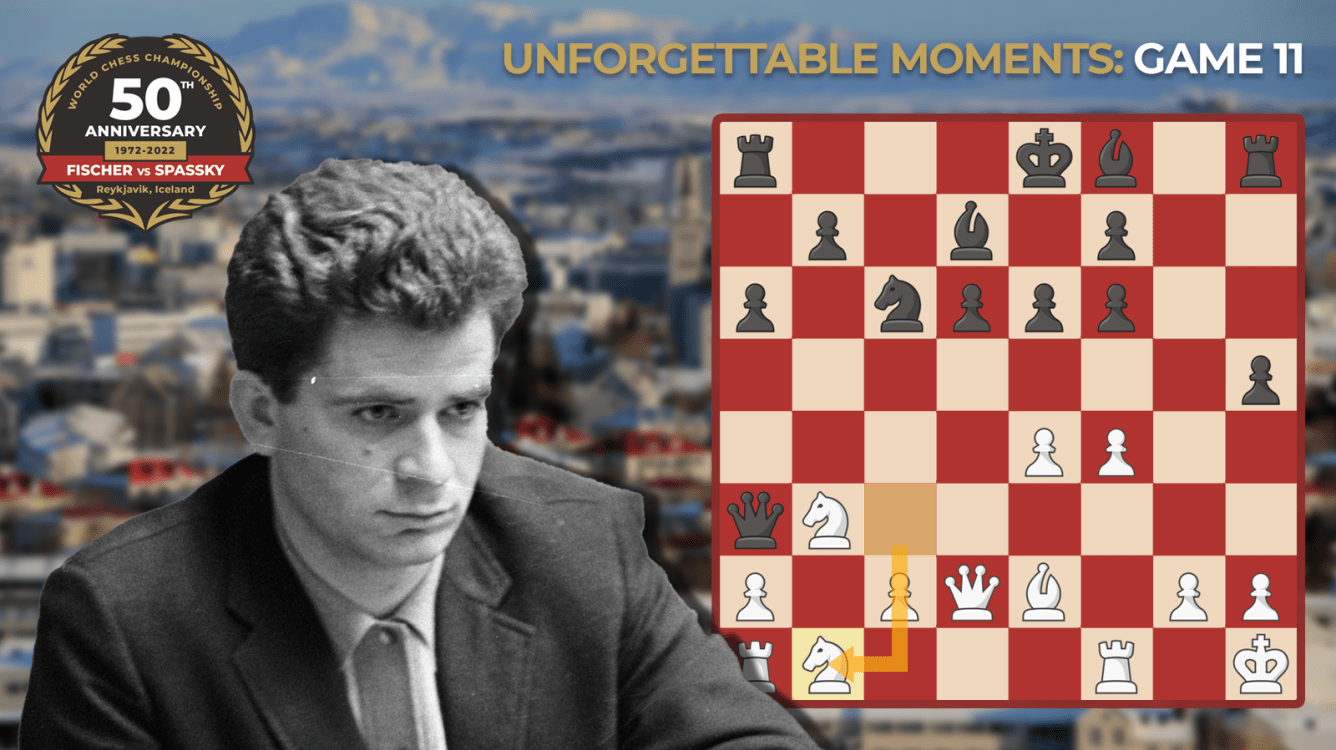
Boris Spassky Smashes Fischer's Najdorf
When we last left the 1972 World Chess Championship, GM Bobby Fischer had just won game six in brilliant fashion to take the match lead. By game 11, the situation was only deteriorating further for defending champion GM Boris Spassky, and his back was against the wall. Spassky had lost his next two games with Black as well and could only draw two games with White. As a result, Fischer now led 6.5-3.5 (five wins to two with three draws).
Put another way, Spassky's margin had gone from plus-2 to minus-3 in just one-third of the scheduled match games—from game three through game 10 of the match, Spassky had lost five times and held just three draws. The reigning world champion desperately needed a reprieve.
That seemed unlikely when Fischer went to one of his strongest openings in the 11th game of the match, the Poisoned Pawn Variation of the Najdorf Variation of the Sicilian Defense. Just as Fischer had never defeated Spassky prior to 1972, he had never lost to any opponent with this opening variation.

Boris Spassky won three games during the match and each of them was strange in its own way. The first game was decided after two blunders by Fischer in an equal endgame. The second game was gifted - the challenger refused to play. As for the eleventh game, it's a mix of both things: mistakes and the feeling that the real Fischer didn't show up for the duel. This happened for a reason—the feared Soviet team prepared a new move in one of the most critical lines of the Najdorf Defense. After being surprised in the opening, Fischer felt the pressure. This explains why he only played the Najdorf once more in the remaining games of the match, and avoided the Poisoned Pawn Variation when he did.
Now Fischer had lost a Poisoned Pawn game. And after this game, he only ever played 40 more serious games in total, all against Spassky. In none of them did he play the same line, apparently convinced even in their match 20 years later that Spassky would have the edge.
Spassky was officially credited with three victories in this championship match. In game one, Fischer played the dubious 29...Bxh2 and lost in 56 moves. In game two, Fischer didn't even show up. In the historical interpretation of the match, both of those games have been given an asterisk—especially the second one, for obvious reasons. But this contest was purely Spassky at his best.
It was the first, and ultimately only, game of the match that Spassky won more than Fischer had lost. According to the Chess.com computer at its deepest level of analysis, Spassky played with 99.4% accuracy overall and not so much as one inaccurate move.

As older chess players, Queen's Gambit fans, and readers of this article series know, major chess events used to adjourn games after 40 moves to be completed on the next day (until the advent of chess supercomputers made this practice obsolete). Game 11 didn't need an adjournment, Spassky had won so thoroughly.
The game was a strong reminder that Spassky wasn't just Fischer fodder. This player was the world champion! It's too easy to think of Spassky as "the guy who lost in 1972" and not as one of history's best players, someone who could win in any type of position.
Spassky wasn't just Fischer fodder. This player was the world champion!
It doesn't help that, because Fischer won by four points despite those two weird losses at the start, 1972 has always been considered a rout. And fair enough.
But after 11 games, Spassky was down by just two points with 13 games still on the schedule. And as the reigning champion, he would only need to tie the match to stay champion.
Although things away from the board had calmed down compared to the match leadup and first two games, Fischer was always liable for a random meltdown, and no one could be sure how he would react if the match got much closer. (In fact, there was a little-known near-disaster for the 17th game of the match, when Fischer was coasting in the actual games.)
In the immediately ensuing 12th game, Spassky finally held another draw with the black pieces. It was his first draw with Black since the fourth game of the match. This Cold War proxy battle wasn't quite over yet.
The 13th game was another story, for another time (but soon!).
Previous 50th Anniversary Fischer-Spassky Articles:
- Bobby Fischer Wins Positional Masterpiece
- Bobby Fischer Ties The Match
- Everything You Need To Know About Bobby Fischer
- Everything You Need To Know About Boris Spassky
- Bobby Fischer Scores 1st Win
- Bobby Fischer Forfeits Game 2
- Bobby Fischer Plays An Incredible Blunder
- 50 Years Later: Why Fischer Vs. Spassky Was The Greatest World Championship Match
- Why The Match Of The Century Almost Didn't Happen




